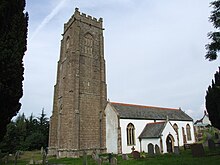William of Wrotham
William of Wrotham , also William de Wrotham (* 12th century; † around 1217) was an English cleric and royal official. He is considered one of the founders of the Royal Navy .
origin
Its exact origin is unknown, his father Godwin was perhaps as a tenant of the Archbishop of Canterbury landowners in the near Wrotham located Shipbourne in Kent . He had at least one brother.
Rise as an official of the king
Wrotham probably already served under the English King Henry II as administrator in Exmoor and in North Petherton in Somerset , where he acquired a larger property over time. Without having received ordination, Wrotham became a canon in Wells in 1194 and received the benefice of the Church of St Decuman in Watchet . He served the noble Geoffrey fitz Peter as administrator of Lydford Castle in Devon . Fitz Peter gave him the Sutton-at-Hone estate in Kent in 1197 . In the same year Wrotham became royal Somerset forest overseer and administrator of the tin mines in Devon and Cornwall , and the following year the Justiciar Archbishop Hubert Walter appointed him superintendent of the tin mines. He held this office, with a brief interruption in 1200, until 1215. From 1198 to 1199 Wrotham was sheriff and judge of Devon and Cornwall. By reorganizing the administration and finance of the mines, he succeeded in considerably increasing the king's income from mining. Probably because of this positive experience, King John Ohneland entrusted him with the taxation of merchants in 1202, and through the favor of the king he became archdeacon of Taunton in 1204 at the latest . In 1205 he was together with Reginald of Cornhill operator of the royal coins of London and Canterbury . At the end of 1204 he administered the temporals during the vacancy of the diocese of Winchester , and in the following year, together with Reginald of Cornhill, the temporals of the vacant abbeys of Bath and Glastonbury . To this end, he managed the income from Whitby Abbey between 1206 and 1209 . From 1209 to 1210 he again served as a royal judge. In order to fulfill his many duties, he appointed his brother Richard to be his deputy as forest warden in Somerset in 1207. Through the variety of his offices and duties Wrotham achieved considerable income and acquired additional benefices and property over time.

Building a royal fleet
As overseer of the ore mines Wrotham was familiar with the shipping of the ore, which is why the king entrusted him from 1204 together with Reginald of Cornhill , the sheriff of Kent, to build up a royal fleet. So far, the king had resorted to the ships of the Cinque Ports in case of war , but after the loss of Normandy , the ongoing war with France required a permanent navy to repel French attacks on the southern coast of England. In 1205 Wrotham became the main person responsible for the construction of the fleet, which he financed from the proceeds of the tin mines. For the planned campaign of 1205 and for the expedition of 1206 to south-west France, he was responsible for the provision of ships. During the campaign of 1206 he was the chief in charge and in command of the ships of the Cinque Ports. The King made him Sheriff of Southampton so that he could expand the port of nearby Portsmouth for the Royal Navy. Under him Portsmouth became the main base of the fleet . Wrotham was responsible for the payment of the ship's crews and took over the cargo of captured enemy ships. Around 1208 he held the duties that were later, from around 1400, the duties of the Lord High Admiral . However, William Longespée , the king's half-brother, took command of the royal fleet .
Later life and death
For the chronicler Roger von Wendover , Wrotham was one of the most important of the poor counselors who supported the king during the papal interdict . During the war of the barons , however, in autumn 1215, when the situation for King John became increasingly hopeless, he switched to the side of the rebels. He was therefore expropriated by the king and lost his offices as administrator of the navy and overseer of the royal forests and Lydford Castle. Presumably through the amnesty of the regent William Marshal after the Peace of Lambeth , he got his possessions back in south-west England in the fall of 1217, but died shortly afterwards. His heir became his nephew Richard of Wrotham , a son of his brother Richard.
1214 he had with Peter des Roches , the God's House Hospital based in Portsmouth. He also donated his estate in Sutton-at-Hone as a hospital , but it later fell to the Order of St. John .
Web links
- Brian Golding: Wrotham, William of (d. 1217/18). In: Henry Colin Gray Matthew, Brian Harrison (Eds.): Oxford Dictionary of National Biography , from the earliest times to the year 2000 (ODNB). Oxford University Press, Oxford 2004, ISBN 0-19-861411-X , ( oxforddnb.com license required ), as of 2004
Individual evidence
- ^ Wilfred L. Warren: King John (= Campus. 209). University of California Press, Berkeley CA 1978, ISBN 0-520-03610-7 , p. 125.
| personal data | |
|---|---|
| SURNAME | William of Wrotham |
| ALTERNATIVE NAMES | William de Wrotham |
| BRIEF DESCRIPTION | English cleric and official |
| DATE OF BIRTH | around 1180 |
| DATE OF DEATH | around 1217 |
